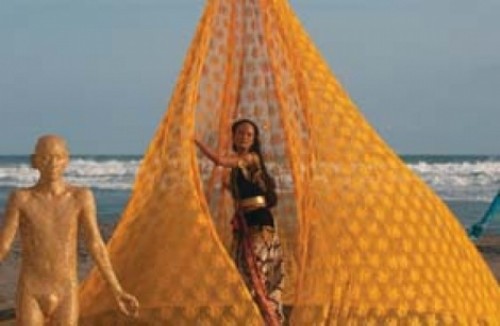Cinema | World Pieces: Only a couple Global Lens titles work as cinema, rather than just educational ethnography.
By Scott Renshaw @scottrenshaw• Johannesburg apparently has both a thriving stand-up comedy scene, and a fondness for “mumblecore.” John Barker’s Bunny Chow mimics the low-budget, largely improvised aesthetic in this tale of three South African comedians dealing with relationship issues before, during and after a road trip to a music festival. Just like in American “mumblecore,” your level of appreciation will depend on how charming you find the characters and their meandering narrative.
• If faking an abortion is your only way to get money from your parents, your life is in pretty bad shape. That’s the situation in the compelling opening sequence of Martin De Salvo and Vera Fogwill’s Kept and Dreamless, which deals with coke addict Florencia’s (played by Fogwill) inability to raise her 9-year-old daughter Eugénia (Lucía Snieg). But once the film moves past that sequence, it attempts to become more darkly comic, with decidedly erratic results.
• Argentina is really f—king depressing. In case Kept and Dreamless wasn’t enough of a nightmare for the tourism board, Rodrigo Moreno’s The Custodian paints an even bleaker portrait. Ruben (Julio Chávez) works as a bodyguard for a government official, immersing himself so deeply in his job that he has virtually no personal life. And while the secretive protagonist provides intrigue for a while, the violent actions that close the film seem to come out of absolutely nowhere just for punishing effect.
• Bosnians have a weird sense of humor. One of the better entries in the series is Antonio Nuiç’s All for Free, a grim comedy about 30-year-old Goran’s (Rukan Rushaidat) decision, after the death of his two best friends, to sell his family home, buy a catering truck and travel the countryside giving away free drinks. It’s an episodic tale that dwells a bit on the facts and figures of Bosnia’s post-war human landscape, but still manages to remain engaging thanks to Rushaidat’s appealing central performance.
• The Lebanese have an even weirder sense of humor. That might be an expected development in the world of Randa Chahal Sabbag’s The Kite, after Israeli annexation places a no-man’s-land between two parts of a community. Initially, it’s pretty hilarious watching two families attempt to finalize an arranged marriage via bullhorn—complete with details about the size of the groom’s penis—but it gets tangled up in an awkward Romeo-and-Juliet thing between the would-be bride (Flavia Bechara) and a guard on the Israeli side (Maher Bsaibes).
• The number “18” in the Philippines apparently represents “testicles.” At least that’s what Amelia—the superstitious titular protagonist of Jeffrey Jeturian’s The Bet Collector—believes, as she roams the streets working for the country’s omnipresent numbers racket. Too bad there’s little more than 90 minutes of her roaming; not even Amelia’s economic desperation and token efforts at psychological subtext can make this movie something that doesn’t suck “18.”
• I’d rather go to the restaurant portrayed in Ali Raffi’s The Fish Fall in Love than watch the movie about it. The director shows plenty of lovingly prepared meals in this story of a man (Reza Kianian) returning to his hometown after 22 years to find his one-time fiancé (Roya Nonahali) running a restaurant out of his family home. The clumsy efforts to work in female empowerment and the jailing of political dissidents collide with wooden acting—but hey, that food looks yummy.
• Indonesian opera kicks ass. The one bona fide gem is Garin Nugroho’s Opera Jawa, a through-sung modern re-telling of the “abduction of Sinta” folk tale. And it’s a spectacular piece of visual filmmaking: bursting with color, fascinating dreamlike set pieces and a range of terrific choreography from tribal stomps to pure modern dance. Sure, I learned something about Javanese culture: I learned that someone there can make a great movie.
GLOBAL LENS @ Broadway Centre Cinemas, 111 E. 300 South, 321-0310, Sept. 5-11, GlobalFilm.org tttt
More by Scott Renshaw
-
Film Reviews: New Releases for April 19
The Ministry of Ungentlemanly Warfare, Abigail, The Beast, Hard Miles, Sasquatch Sunset and more
- Apr 19, 2024
-
Faces of Salt Lake County book and portrait reception
Images and personal stories in a new book reveal local demographic diversity
- Apr 17, 2024
-
Feature film review: THE BEAST
A filmmaker's compelling ideas get a bit tangled in references to his creative influences.
- Apr 17, 2024
- More »




